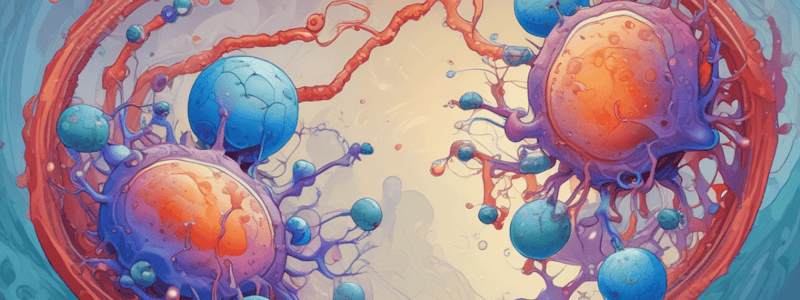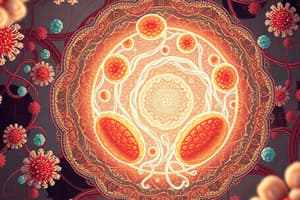Podcast
Questions and Answers
What is the primary function of ribosomes?
What is the primary function of ribosomes?
- Protein synthesis (correct)
- DNA replication
- Lipid synthesis
- Energy production
What do ribosomes contain large amounts of?
What do ribosomes contain large amounts of?
- DNA
- tRNA
- mRNA
- rRNA (correct)
Where are ribosomes commonly found attached?
Where are ribosomes commonly found attached?
- Endoplasmic Reticulum (correct)
- Mitochondria
- Lysosomes
- Golgi apparatus
Besides the Endoplasmic Reticulum, where else can ribosomes be attached?
Besides the Endoplasmic Reticulum, where else can ribosomes be attached?
Which type of RNA is abundant in ribosomes?
Which type of RNA is abundant in ribosomes?
What is phagocytosis?
What is phagocytosis?
Which step involves the fusion of the lysosome with the phagosome?
Which step involves the fusion of the lysosome with the phagosome?
What are the two main phagocytes?
What are the two main phagocytes?
What is formed after the microbe is engulfed by the cell membrane?
What is formed after the microbe is engulfed by the cell membrane?
Which cell organelle contains digestive enzymes to break down the microbe?
Which cell organelle contains digestive enzymes to break down the microbe?
What is the cytosol?
What is the cytosol?
Which of the following best describes the function of organelles?
Which of the following best describes the function of organelles?
Where do many chemical reactions in a cell occur?
Where do many chemical reactions in a cell occur?
What is usually released by the chemical reactions in the cytosol?
What is usually released by the chemical reactions in the cytosol?
What do the reactions in the cytosol provide for the cell?
What do the reactions in the cytosol provide for the cell?
Microfilaments are primarily composed of which protein?
Microfilaments are primarily composed of which protein?
Where are intermediate filaments mainly concentrated?
Where are intermediate filaments mainly concentrated?
What is the primary function of microtubules?
What is the primary function of microtubules?
Which cytoskeletal element is associated with generating movement?
Which cytoskeletal element is associated with generating movement?
Which type of protein makes up intermediate filaments?
Which type of protein makes up intermediate filaments?
Where do microtubules extend from within the cell?
Where do microtubules extend from within the cell?
What process describes a cell absorbing extracellular fluid?
What process describes a cell absorbing extracellular fluid?
Which of the following happens LAST during pinocytosis?
Which of the following happens LAST during pinocytosis?
Which type of endocytosis does NOT involve receptor proteins?
Which type of endocytosis does NOT involve receptor proteins?
Which cellular structure fuses with the vesicle to digest its content during pinocytosis?
Which cellular structure fuses with the vesicle to digest its content during pinocytosis?
What is the main purpose of the lysosomal enzymes during pinocytosis?
What is the main purpose of the lysosomal enzymes during pinocytosis?
What is the primary function of the rough endoplasmic reticulum?
What is the primary function of the rough endoplasmic reticulum?
Which component is NOT found on the rough endoplasmic reticulum?
Which component is NOT found on the rough endoplasmic reticulum?
Which is a function of the smooth endoplasmic reticulum?
Which is a function of the smooth endoplasmic reticulum?
What is the structural difference between rough ER and smooth ER?
What is the structural difference between rough ER and smooth ER?
Which substances are detoxified by the smooth endoplasmic reticulum?
Which substances are detoxified by the smooth endoplasmic reticulum?
What is the primary function of cilia?
What is the primary function of cilia?
Which of the following is true about flagella?
Which of the following is true about flagella?
Which statement accurately describes the length of flagella compared to cilia?
Which statement accurately describes the length of flagella compared to cilia?
What is the only cell type mentioned to have flagella?
What is the only cell type mentioned to have flagella?
How do cilia differ from flagella in their primary function?
How do cilia differ from flagella in their primary function?
What is a vesicle?
What is a vesicle?
During which process do materials move into a cell in a vesicle?
During which process do materials move into a cell in a vesicle?
Which type of endocytosis involves the ingestion of large particles like bacteria?
Which type of endocytosis involves the ingestion of large particles like bacteria?
What happens during exocytosis?
What happens during exocytosis?
What is transcytosis?
What is transcytosis?
What forms a basketlike structure on the cytosolic side of the membrane during receptor-mediated endocytosis?
What forms a basketlike structure on the cytosolic side of the membrane during receptor-mediated endocytosis?
Which of these particles can receptor proteins recognize and bind to during receptor-mediated endocytosis?
Which of these particles can receptor proteins recognize and bind to during receptor-mediated endocytosis?
What happens to the receptor proteins after the vesicle fuses with an endosome?
What happens to the receptor proteins after the vesicle fuses with an endosome?
At what stage is the clathrin coat removed during receptor-mediated endocytosis?
At what stage is the clathrin coat removed during receptor-mediated endocytosis?
Where is the LDL particle degraded during receptor-mediated endocytosis?
Where is the LDL particle degraded during receptor-mediated endocytosis?
What step follows the internalization of the receptor-LDL complex when the plasma membrane invaginates?
What step follows the internalization of the receptor-LDL complex when the plasma membrane invaginates?
What is the primary function of exocytosis in neurons?
What is the primary function of exocytosis in neurons?
Which ion is crucial for triggering the fusion of synaptic vesicles with the presynaptic membrane?
Which ion is crucial for triggering the fusion of synaptic vesicles with the presynaptic membrane?
What happens immediately after the neurotransmitter binds to receptors on the postsynaptic neuron?
What happens immediately after the neurotransmitter binds to receptors on the postsynaptic neuron?
What causes the nerve impulse to reach the synaptic end bulb in the presynaptic neuron?
What causes the nerve impulse to reach the synaptic end bulb in the presynaptic neuron?
What role do voltage-gated calcium channels play in exocytosis?
What role do voltage-gated calcium channels play in exocytosis?
What process can happen to the neurotransmitter after being released into the synaptic cleft?
What process can happen to the neurotransmitter after being released into the synaptic cleft?
Which type of channels open in response to the neurotransmitter binding to receptors on the postsynaptic neuron?
Which type of channels open in response to the neurotransmitter binding to receptors on the postsynaptic neuron?
What signifies the end of the exocytosis process in the synapse?
What signifies the end of the exocytosis process in the synapse?
Flashcards are hidden until you start studying
Study Notes
Phagocytosis
- A form of endocytosis where cells engulf large particles like viruses, bacteria, or dead cells
- Main phagocytes are macrophages and neutrophils
- Process involves attachment of microbe to receptor on cell membrane, formation of pseudopods, and fusion with lysosome for digestion
Ribosomes
- Sites of protein synthesis
- Contain large amounts of ribosomal RNA (rRNA)
- Attached to outer surface of nuclear membrane and Endoplasmic Reticulum
Cytoplasm
Cytosol
- Intracellular fluid surrounding organelles
- Site of many chemical reactions
- Energy released from these reactions provides building blocks for cell maintenance, structure, function, and growth
Organelles
- Specialized structures within the cell
Exocytosis
- Release of materials from cells
- Important for neurotransmitter signaling
- Steps involved: nerve impulse, Ca2+ influx, fusion of synaptic vesicles with membrane, release of neurotransmitter, binding to receptors, and opening of ligand-gated channels
Cilia and Flagella
- Motile projections of the cell surface
- Cilia: short, hair-like projections that move fluids along a cell surface
- Flagella: longer than cilia, move an entire cell (example: sperm cell's tail)
Endoplasmic Reticulum
- Network of membranes in the shape of flattened sacs or tubules
- Rough ER: connected to nuclear envelope, studded with ribosomes, produces secretory, membrane, and organellar proteins, and attaches carbohydrates to proteins
- Smooth ER: synthesizes fatty acids and steroids, detoxifies certain drugs
Cytoskeleton
- Network of protein filaments throughout the cytosol
- Provides structural support for the cell
- Three types:
Microfilaments
- Composed of actin, associated with cell membrane and inside the cell
- Generate movement, provide mechanical support
Intermediate Filaments
- Composed of keratin or other proteins, concentrated near the nucleus
- Stabilize organelle position, attach cells together
Microtubules
- Composed of tubulin, extend from the centrosome to cell membrane
- Determine cell shape, move organelles and vesicles
Vesicular Transport
- Vesicle: a small spherical sac formed by budding off from a membrane
- Endocytosis: materials move into a cell in a vesicle
- Exocytosis: vesicles fuse with the plasma membrane, releasing their contents
- Transcytosis: combination of endocytosis and exocytosis
Bulk-phase Endocytosis (Pinocytosis)
- No receptor proteins involved
- Transport of extracellular fluid
- Plasma membrane folds inward, forming a vesicle containing the fluid
Receptor-mediated Endocytosis
- Receptor proteins recognize and bind to specific particles like LDLs, vitamins, antibodies, and hormones
- Clathrin molecules form a basketlike structure on the cytosolic side of the membrane, forming a vesicle
- Vesicle fuses with an endosome, receptor proteins are recycled, and the particle is degraded in a lysosome
Studying That Suits You
Use AI to generate personalized quizzes and flashcards to suit your learning preferences.




